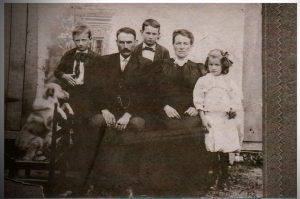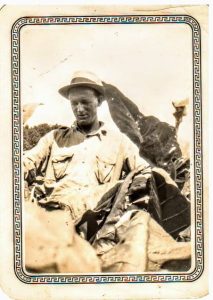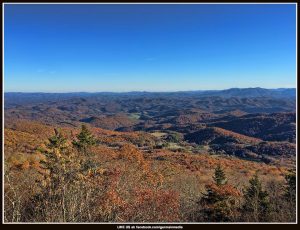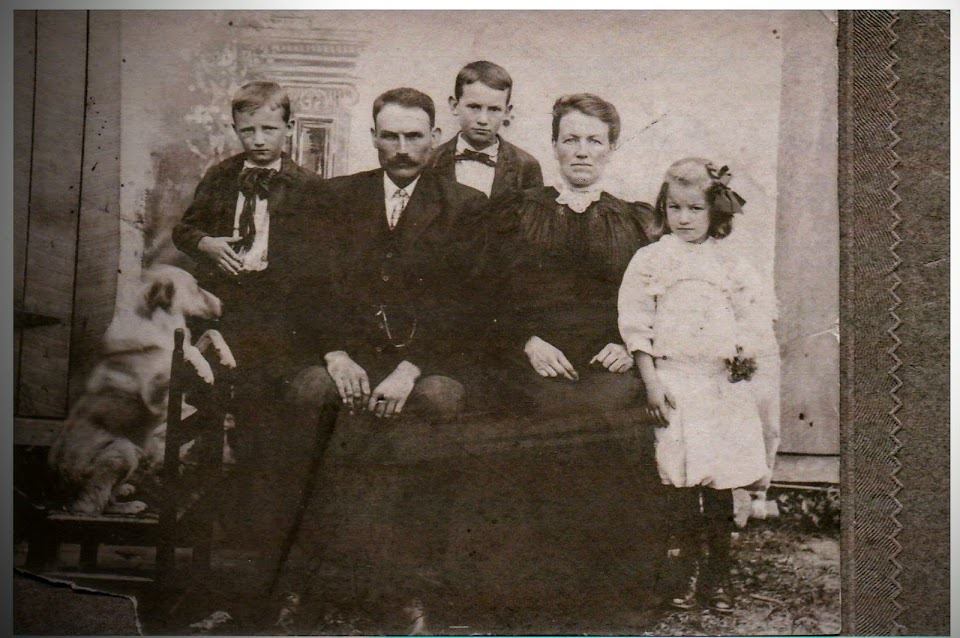I got a lot of things to tell you about livin’ in these ole hills. Why, I’ve told these bits and pieces over an’ over through the years, first to my young’uns an’ then to my young’uns young’uns. But you need to hear ‘em, too, so you listen right close now. You might learn something.
My mommy birthed me on the first day of October in the year 1900 an’ 2. I wuz born tough, still am. You had to be born tough back then, or die one. That wuz even afore Wilbur and Orville flew their plane at Kitty Hawk. Now, they say they landed men on the moon, but I don’t b’lieve a word of it. I think they set that spaceship up out thare in the desert somewhere and made the whole thing up.
 As I said, I’uz born on October 1, 1902, and I’ve lived right here in Ashe County all my life. People didn’t molly coddle their young’uns along then like they do now, an’ I wuz only knee high to a grasshopper when Dad put me out in the fields to work. I had two brothers, but one of them wudn’t old enough to help out much. We swapped a whole lot of work. One had to plow our corn, an’ the hoer had to take a hoe an’ dig the weeds out. There wudn’t no money involved. My dad hired a little work, but we mostly swapped fer it with the other boys and girls.
As I said, I’uz born on October 1, 1902, and I’ve lived right here in Ashe County all my life. People didn’t molly coddle their young’uns along then like they do now, an’ I wuz only knee high to a grasshopper when Dad put me out in the fields to work. I had two brothers, but one of them wudn’t old enough to help out much. We swapped a whole lot of work. One had to plow our corn, an’ the hoer had to take a hoe an’ dig the weeds out. There wudn’t no money involved. My dad hired a little work, but we mostly swapped fer it with the other boys and girls.
I bet you’re wonderin’ why I wuz in the fields instead of in school where I shoulda been. Well, I’ll tell you, hardly any boys got very far in school back then. There wuz too much work to do. I went fer two or three years. I think I quit when I wuz in the second grade to help Dad with the farm. He traded cattle, but he grew a whole slew of crops, too. He’d trade cattle while us boys worked the fields. I got enough schooling to git by, though. I can do any cipherin’ I need to, an’ I can read an’ write purty good.
We had to work a lot, an’ it wuz hard work, but that didn’t keep us from havin’ fun after the workday wuz done. We didn’t have no television or anything like that, so we had git-togethers and had all sorts of fun. One of the things I like best was corn huskin’. We used to have big piles of corn shaped like a roof on a house. Ever’body would stop their work to come shuck that whole pile of corn in one day. You had to help your neighbors, an’ they’d help you. You might have one shuckin’ one day an’ anothern the next day.
 We’d kill chickens and ever’thing an’ have the awfulest dinner you ever saw in the world. We’d commence eating at 11:00 an’ eat ‘til 2:00. Then, we’d go back to the corn pile an’ keep on shuckin’ We’d have races for speckled corn an’ red corn. There’d be 5, 10, sometimes 15 ears buried in the pile. We raced to see who could find one first an’ who could find the most.
We’d kill chickens and ever’thing an’ have the awfulest dinner you ever saw in the world. We’d commence eating at 11:00 an’ eat ‘til 2:00. Then, we’d go back to the corn pile an’ keep on shuckin’ We’d have races for speckled corn an’ red corn. There’d be 5, 10, sometimes 15 ears buried in the pile. We raced to see who could find one first an’ who could find the most.
Sometimes when I wuz young, they’d tie a bottle of whiskey in the pile to see who could find it the quickest. My dad said that back when he wuz a boy that the women folk made the whiskey because the men didn’t have the time. They’d even take a water bucket with a dip in it an’ pass it aroun’ to the crowd of corn shuckers.
We had a time or two ever’ week in the fall of the year where thare’d be apple cuttin’s, molasses makin’, bean stringin’s. All the young folks’d gather in an’ we’d have a big party. We’d play games like Drop the Handkerchief, the Virginia Reel, an’ stuff like that. We’d play ‘til midnight or after. We worked hard to get through hullin’ beans or whatever we wuz doin’.
Back when I wuz a boy, there wudn’t a week that would pass when thare wudn’t some good musicians to gather in an’ make music an’ play games. At least once or twice a week an’ always on Saturday night we’d play. Nowadays, young’uns just git in the car an’ hit the road. They don’t have any gatherin’s like we did then. We’d walk in an’ set for a minute an’ thare’d be a big crowd of maybe 40 or 50 at a time. Ever’body had a big time. Thare wudn’t’ any cars on the roads to ride in. It was a heap more fun than thare is in the world now. When you git in the car now you don’t even have time to talk to nobody.
Now, thare wuz one time we went up on Whitetop Mountain just over the line in Virginia. There wuz a dancin’ hall up thare, an’ people from ever’where went up thare to make music an’ dance. Why, my Uncle Bud could dance like nobody’s business.1 He wuz just about the best dancer anywhere around, but well, that’s not what I wanna tell.
What I wanna tell is that Mrs. Roosevelt, Franklin D.’s wife, wuz up thare one time. They set up this big tent behind the dancin’ hall close to the barn. It had seats that held a sight of people. I didn’t meet her, but I got to see Mrs. Roosevelt up thare. I can tell you one thing–she wuz just about the homeliest woman I ever saw. We stayed thare all night ‘cause it wuz high up an’ the fog’d be thick. We laid down on the grass in the tent. Somebody stole my hat. I woke up, an’ my hat was gone. I never did get it back.
You know, I liked Franklin D. I think he wuz a good president. But that Truman, now, he wuz a captain. He’d come right out an’ say just what he thought. I remember a lot of the presidents, Wilson an’ some of the others, but I think I liked Truman the best.
People’s always askin’ me about what it wuz like during the wars back then. Well, I don’t remember too much about WWI. I knew it wuz purty bad, but I was only about 14 when it started an’ 17 when it wuz over. You didn’t hear too much of it aroun’ here, anyways. News from Outside didn’t come too often, an’ besides that, people wuz dyin’ all over from the swine flu at that time. I had it, too, but I guess you can see that it didn’t kill me.
Now, WWII was another story. We had a radio by then an’ could get news from Outside on it, an’ we could listen to Franklin D. do those fireside chats as he called ‘em. I wuz about 40 years ole when it started, so I had to register. I wuz in the fourth class, an’ I didn’t get called up. I missed all the wars. I didn’t have to go.
 I was still purty worried because my younger brother had to go. He went to New Guinea. He wuz in shell shock. They had to fill his mouth with cotton to keep him from bitin’ his tongue off. I had a whole lot of friends that went, too. I didn’t have too many of ‘em die, but I did have a second cousin die. Thare wuz four or five boys (a boy from up here, another boy from Mill Creek, and one just over yonder) went in the army. They all came out safe. These boys said if you kept your eyes open, thare wasn’t much danger. These boys used to squirrel hunt. Thare wuz four or five of ‘em, an’ they all came back without a scratch. They kept their eyes open is all.
I was still purty worried because my younger brother had to go. He went to New Guinea. He wuz in shell shock. They had to fill his mouth with cotton to keep him from bitin’ his tongue off. I had a whole lot of friends that went, too. I didn’t have too many of ‘em die, but I did have a second cousin die. Thare wuz four or five boys (a boy from up here, another boy from Mill Creek, and one just over yonder) went in the army. They all came out safe. These boys said if you kept your eyes open, thare wasn’t much danger. These boys used to squirrel hunt. Thare wuz four or five of ‘em, an’ they all came back without a scratch. They kept their eyes open is all.
You know, I farmed my whole life, but I did have another job for two weeks one time when I wuz a boy. I cut the extracts of timber. That’s when I got this big ole knot on the top of my foot. I wuz usin’ the axe that day, an’ I mighta had a drink or two. I come down with that axe an’ missed the wood completely an’ cut right into my foot. Thare wudn’t no doctor up thare, so I just bandaged it up, an’ that’s how it healed.
I liked farmin’ better than workin’ timber. I like farmin’, raisin’ cattle an’ sheep. When you farm, you don’t need much from Outside. We had to git a little stuff from the store, but mighty little. We had to git sugar, coffee, rice, oatmeal, an’ stuff like that. Money wuz real scarce, so we bartered a lot of stuff.
Times wuz always hard here, but when the Depression hit, ever’thing got worse.
I usually raised some tobaccer, but I cudn’t git anything out of it. Abingdon wuz the closest market. I took it to market that first year, but I brought it right back home. I twisted it up. I kept it an’ sold it fer 20 cents a pound. The merchant sold it out to people, an’ we took it up in groceries. We lost some money on cattle then, too. I bought some steers at 11 cents a pound an’ kept ‘em a year. I got 3 ¾ for ‘em next fall. Why, we wuz so pore, we even went into the woods to pick up chestnuts. We’d pick ‘em up by the bucket full an’ then sell ‘em so we could buy the young’uns shoes for the winter.
It wuz a bad time. Ever’body wuz hard up. The houses are all in good shape now, no sorry houses. They used to live in ever’ kind of old house then. Just a few people, the high class people, had good houses. A lot of ‘em, the lower class, didn’t have much.
Look at us now. Times has changed. We’ve lived in this big brick house fer goin’ on 26 years now, an’ we have ever’thing we need and then some. I got a truck in the garage. Life’s turned out all right fer us, but I’m not sure I b’lieve we’re better off. Those ole days wuz hard days, but people wuz closer then. They helped each other more.
But time marches on, don’t it? I could tell those old stories ‘til the cows come home, but you just take what I told you and pass it on. Times’ll be hard again sometime, an’ folks need to know that times has been hard before. They need to know to take it as it comes an’ take time to have some fun, too; worryin’ won’t do them no good. Just keep goin’, that’s the thing.
You go on along now.
____________________
Towards the end of the 1960s and especially in the 1970s and 1980s, America woke up to Appalachia. People flocked in from Outside to see and talk to us about everything from what we ate to what we did for heat in the winter. It was during this time that interviewing people who lived in the Appalachian Mountains reached a frenzy. Those who did the research and conducted the interviews realized what a treasure our people and our lore were, and they jumped at any opportunity to talk with anyone who had knowledge of the old ways. My family sure did know the old ways, so the people from the Appalachian Oral History Project promptly interviewed all of us. The story you’ve just read came from answers Paw (Breece Spencer) gave to their questions. Most all of what’s there are his own true words. I’ve filled in around them to give it the feel of a tale.
The Appalachian Oral History Project started in 1970 as a collaboration between Alice Lloyd College in Pippa Passes, KY, Appalachian State University in Boone, NC, Emory & Henry College in Emory, VA, and Less Junior College in Jackson, KY.2
______
1http://mountainmusicmagazine.weebly.com/special-interest-articles/speedy-tolliver-whitetop-folk-festival-more
Scroll all the way down to the end of the article at the link above, and you can see a short clip of Uncle Bud dancing at the Whitetop Dance Hall.
2http://library.ehc.edu/services/archives/appalachian-oral-history-project

